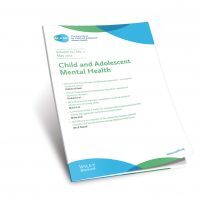Adverse Childhood Experiences (ACEs)
-

Psychotic-like experiences and adverse life events in young people. Does gender matter?
Paper from the CAMH journal – ‘Psychotic-like experiences (PLEs) and adverse life events (ALEs) are highly prevalent in sub-Saharan Africa where gendered practices are also common. There is, however, a paucity of data on how the relationship between PLEs and life adversities is influenced by gender. The current study addressed this gap.’ Samuel Adjorlolo (pic) et al.
Read more -

Practitioner Review: Neurobiological consequences of childhood maltreatment – clinical and therapeutic implications for practitioners
Paper from the JCPP – ‘In this report, we explore key validated alterations in brain structure, function, and connectivity associated with exposure to childhood maltreatment as potential mechanisms behind their patients’ clinical presentations.’ Jacqueline A. Samson (pic) et al.
Read more -

CAMH Editorial, Volume 28, Issue 3, September 2023
CAMH September 2023 Editorial is now available to read.
Read more -

Early childhood general anesthesia and risk of Attention Deficit Hyperactivity Disorder
Paper from the JCPP – ‘This population-based cohort study aimed to investigate the potential relationship between general anesthesia (GA) exposure and ADHD risk using propensity score matching (PSM) in a large sample size’. Mingyang Sun et al.
Read more -

Subjective and objective experiences of childhood adversity: a meta-analysis of their agreement and relationships with psychopathology
Open Access paper from the JCPP – ‘Researchers use both subjective self-report and objective measures, such as official records, to investigate the impact of childhood adversity on psychopathology. However, it is unclear whether subjective and objective measures of childhood adversity (a) show agreement, and (b) differentially predict psychopathology. To address this, we conducted a pre-registered meta-analysis to examine the agreement between subjective and objective measures of childhood adversity, and their prediction of psychopathology’. Emma R. Francis (pic) et al.
Read more -

The acute effects of community violence on young children’s regulatory, behavioral, and developmental outcomes in a low-income urban sample in Brazil
Paper from the JCPP – ‘This study leverages natural variation in the timing and location of community homicides to estimate their acute effects on the regulatory, behavioral, and developmental outcomes of Brazilian 3-year-olds.’ Dana C. McCoy (pic) et al.
Read more -

Clinical Review: Sleep disturbance as transdiagnostic mediator between adverse childhood experiences and psychopathology in children and adolescents: A structural equation modeling meta-analysis
Open Access paper from JCPP Advances – ‘The present study used a novel two-stage meta-analytic structural equation model to investigate whether ACEs predict psychopathology through sleep disturbance’. Jianlin Liu et al.
Read more -

Childhood mental health difficulties mediate the long-term association between early-life adversity at age 3 and poorer cognitive functioning at ages 11 and 14
Open Access paper from the JCPP – ‘Here, we test the hypothesis that early-life adversity may lead to mental health challenges which in turn have adverse consequences for the development of cognitive abilities.’ Tochukwu Nweze (pic) et al.
Read more -

JCPP Editorial: Volume 63, Issue 11, November 2022
Editorial: Accelerated epigenetic ageing as a consequence of early environmental adversity by Barbara Franke
Read more -

Effects of maternal childhood trauma on child emotional health: maternal mental health and frontoamygdala pathways
Paper from the JCPP – “Experiences of early life adversity pose significant psychological and physical health risks to exposed individuals”. Jessica P. Uy et al.
Read more